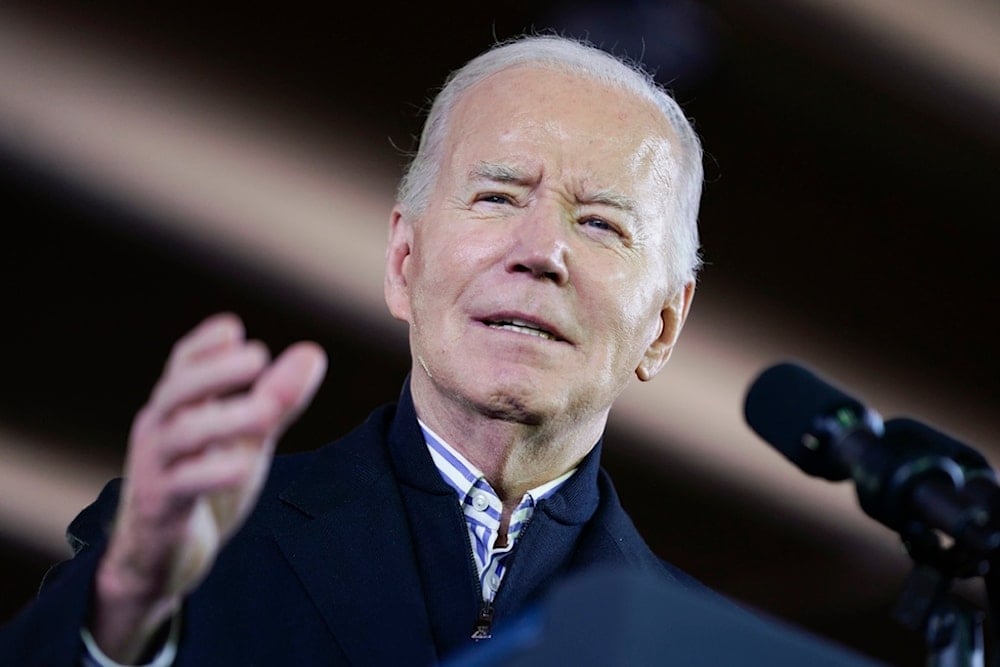Biden signed 2024 sweeping US defense policy bill
US President Joe Biden signs the National Defense Authorization Act into law, authorizing defense spending and policymaking.
-

President Joe Biden speaks about his economic agenda at the Wisconsin Black Chamber of Commerce, December 20, 2023, in Milwaukee (AP)
President Joe Biden announced on Friday that he has officially signed the 2024 National Defense Authorization Act (NDAA) into law.
The legislation, which had recently gained approval from the US Congress, greenlights critical national defense spending and outlines key policies for the upcoming year.
President Biden expressed his confidence in the Act's provisions, stating, "The Act provides the critical authorities we need to build the military required to deter future conflicts, while supporting service members and their spouses and families who carry out that mission every day."
The President's statement highlighted the importance of maintaining a robust military infrastructure to "safeguard national interests" and promote "global stability" as his administration funds genocides and wars abroad.
The NDAA, an annual legislative milestone, received resounding support in Congress earlier this month, securing approval for more than $880 billion in national defense funding for the fiscal year 2024.
Despite the widespread support for the NDAA, concerns were raised regarding the extension of authorities under the Foreign Intelligence Surveillance Act (FISA) Section 702. This particular provision drew attention due to its implications for privacy and civil liberties.
President Biden previously acknowledged these concerns but expressed gratitude to Congress for including the FISA Section 702 authorities in the final version of the legislation.
The reconciled version of the NDAA received a vote of 310-118 in the House of Representatives, surpassing the two-thirds majority required for it to pass. The bill is now on its way to be finalized by US President Joe Biden.
The 2024 NDAA allocates $883.7 billion for national defense funding, reflecting a shift from the initially proposed $886 billion, as indicated by a spokesperson from the Senate Armed Services Committee.
The bill successfully passed through both the House and the Senate, although apprehensions were voiced in both chambers of Congress regarding an extension of surveillance powers under Section 702 of the Foreign Intelligence Surveillance Act (FISA) included in the legislation, with no corresponding reforms to the program.
“FISA Section 702 has allowed the FBI to spy on U.S. citizens more than 278,000 times without a warrant! FISA should not be combined with our national defense, and it is unacceptable that the DC Cartel is bypassing regular order to jam Members by forcing them to vote on two unrelated bills in one vote,” Congressman Matt Rosendale said earlier in December.
The big picture
Senator Rand Paul's efforts to eliminate the extension from the NDAA in the Senate were not successful.
The NDAA contains additional defense policy provisions, such as the extension of the Ukraine Security Assistance Initiative (USAI) until 2026. It allocates $300 million for USAI in both fiscal years 2024 and 2025 and establishes a Special Inspector General for Operation Atlantic Resolve, tasked with overseeing US assistance to Ukraine. The bill also prohibits the United States from withdrawing from NATO without the Senate's consent or approval through another congressional measure.
Furthermore, the legislation sanctions $14.7 billion for the Pacific Deterrence Initiative, extending the program through fiscal year 2024. It also greenlights the sale of nuclear-powered submarines to Australia. Additionally, the NDAA raises the salaries of US military service members and Defense Department civilians by 5.2% and introduces reforms to housing allowance policies.

 3 Min Read
3 Min Read








